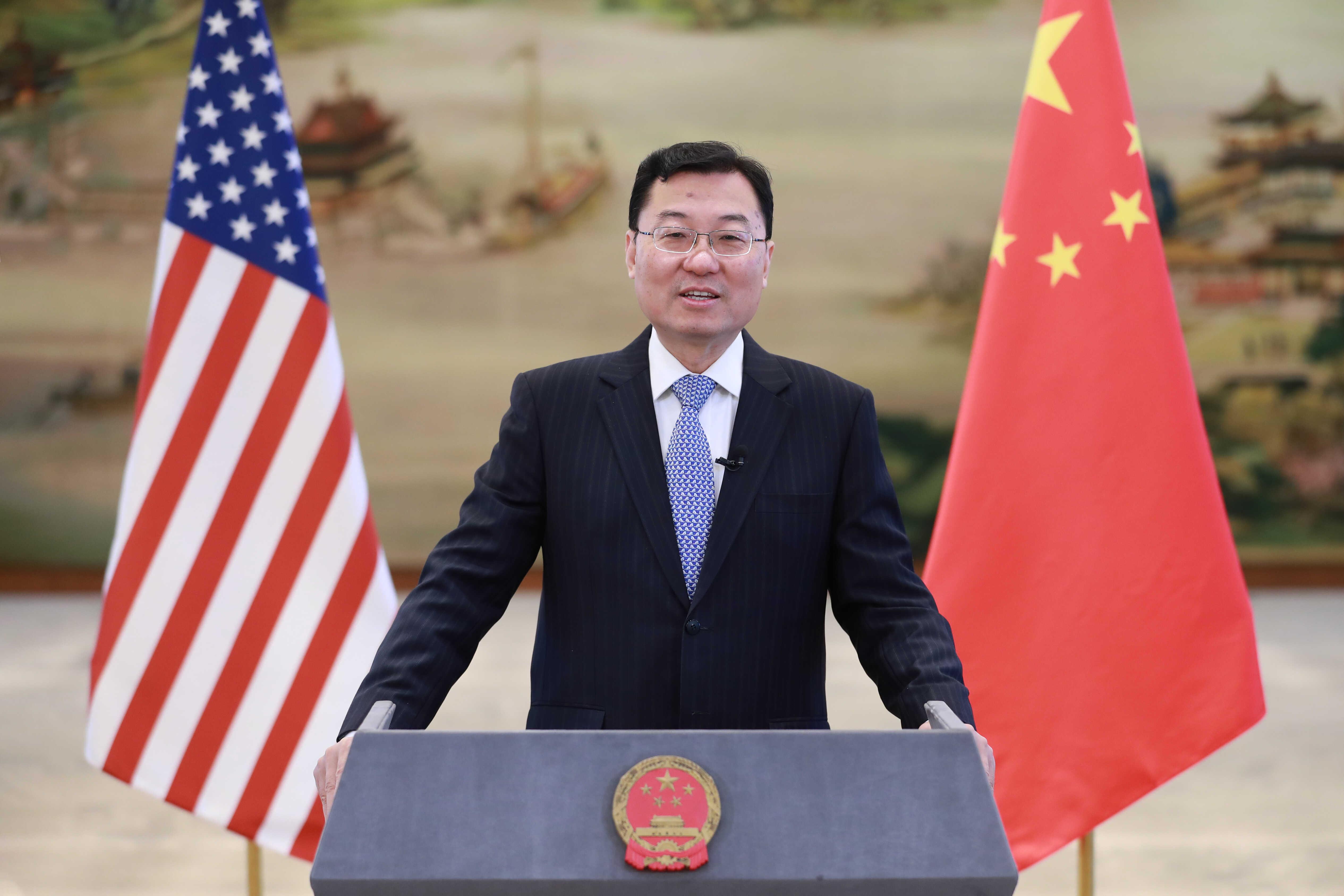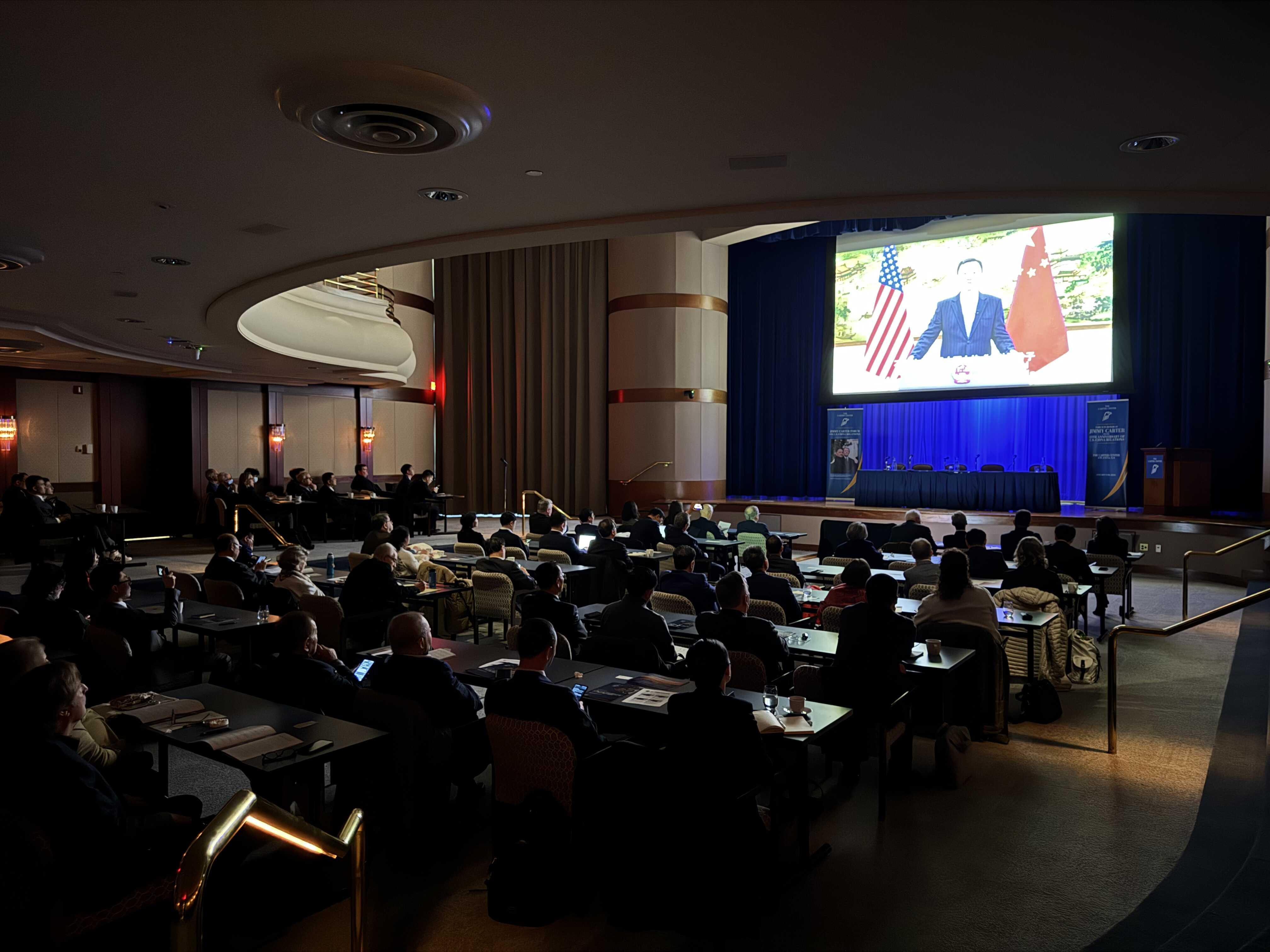
On January 9, 2024, Chinese Ambassador to the United States Xie Feng attended the Carter Center Forum commemorating the 45th anniversary of the establishment of U.S.-China relations and delivered remarks via video link.
Ambassador Xie said that President Xi Jinping and President Joe Biden exchanged congratulatory letters on January 1 this year, speaking highly of the historical significance of the establishment of diplomatic relations between China and the United States, recognizing the historic achievements in China-U.S. relations over the past 45 years, and expressing readiness to jointly steer the relationship forward. Over the past 45 years, the China-U.S. relationship has kept forging ahead despite twists and turns, growing into the most important bilateral relationship in the world today. It has boosted the well-being of the two peoples, and also contributed to peace, stability and prosperity in the Asia-Pacific and the world. Taking stock of the past 45 years, we believe that the most important inspiration is that China and the United States stand to gain from cooperation and lose from confrontation, and working together is our only correct choice. The broadest consensus is that we should make the China-U.S. relationship work and not mess it up, which is also a shared expectation of the international community. The only right way to get along is mutual respect, peaceful coexistence and win-win cooperation.
Ambassador Xie said that the China-U.S. relationship is again at a new historical starting point. Let's stay true to the commitment we made when establishing diplomatic ties, act in line with the trend of the times, show foresight, courage and creativity, and live up to our responsibilities. We need to embark on a new journey from San Francisco onward, start with concrete steps, and faithfully deliver on the important common understandings reached between our Presidents, so as to turn the San Francisco vision into reality, and write more success stories of mutual respect, peaceful coexistence and win-win cooperation between our two countries.
Ambassador Xie noted that it is important to reject the Cold War mentality, and develop a right perception toward each other. Are we adversaries, or partners? This is the fundamental and overarching question we need to answer. If one sees the other side as a primary competitor, a pacing threat and a target for containment, improving and stabilizing bilateral relations would be out of the question. China's domestic and foreign policies are open and transparent, with clearly stated strategic intentions and development goals. Our central task is to advance national rejuvenation on all fronts by pursuing Chinese modernization, so as to deliver better jobs and better lives to the 1.4 billion people, and ensure every child receives good education. Following the path of peaceful development is China's solemn commitment. We aspire to build a community with a shared future for mankind with other countries. We will never seek hegemony with growing strength. Still less do we plan to challenge or unseat the United States. It is our sincere hope to be partners and friends with the United States. We are convinced that the Earth is big enough for China and the United States to develop respectively and prosper together, that our success is each other's opportunity rather than challenge, that the two sides need to help each other succeed instead of undercutting one another, and that the world should not be thrust back into division and bloc confrontation. At the same time, China has interests that must be safeguarded, principles that must be upheld, and red lines that must not be crossed.
Ambassador Xie noted that it is important to manage differences and disagreements, and keep to the right direction of China-U.S. relations. This relationship has always been based on recognizing differences and respecting each other's core interests. Differences did not prevent us from establishing and developing relations 45 years ago. There is even less reason why they should block our exchanges and cooperation now. Indeed, competition is commonplace in the modern world. But it should be fair competition that abides by rules and a healthy race to the top, not a zero-sum game, still less a pretext for depriving others of their legitimate development rights and interests. Competition between countries should be like competing with each other for excellence in a racing field, not beating one another in a wrestling ring. If we do need to compete, then let's compete to do a better job in running our country and contribute more to the stability and prosperity in the region and the world.
Ambassador Xie stressed that the Taiwan question is the most important and sensitive question in China-U.S. relations. No one cherishes more than the Chinese side peace and stability across the Taiwan Strait. But separatism for "Taiwan independence" is as incompatible with peace of the Strait as fire with water. When it comes to "Taiwan independence" separatists who betray their motherland and refuse to identify themselves as Chinese, the Chinese government simply has no room for compromise. The U.S. side should abide by the one-China principle and the three Sino-U.S. joint communiques with concrete actions, earnestly deliver on the statements by American leaders that the United States does not support "Taiwan independence" and has no intention to use Taiwan as a tool to contain China, and work with China to maintain peace and stability across the Strait and the overall China-U.S. relations.
Ambassador Xie noted that it is important to focus on common interests and let dialogue and cooperation define the relationship. It is common interests that brought China and the United States together 45 years ago. It is also common interests that have kept driving our relationship forward. The world today has entered a new period of turbulence and transformation. As permanent members of the Security Council and the two largest economies, China and the United States have only more, rather than fewer, common interests and shared responsibilities in safeguarding world peace and promoting development for all. Whether it is in bilateral areas such as economy and trade, energy, agriculture, law enforcement, education and people-to-people exchanges, or in combating global challenges like climate change and public health, or on international and regional hotspots such as the Middle East, Ukraine and the Korean Peninsula, there are a lot of things that China and the United States can and should coordinate and cooperate on.
Recently, China has taken a series of positive measures on economics and trade, cooperation on panda conservation, counternarcotics, mil-to-mil exchanges, climate change and artificial intelligence to further open up and facilitate China-U.S. exchanges and cooperation. It is hoped that the U.S. side will also take real actions in the same spirit to address China's concerns. It is important to start with small steps which can go a long way, pursue reciprocity and mutual benefit, both give and take, fully utilize the restored and new mechanisms in foreign policy, economy, finance, commerce, agriculture and other fields, expand the list of cooperation and shorten the negative list, and solve rather than create problems.
Ambassador Xie noted that it is also important to remove obstacles and spark a new boom in people-to-people exchanges. Due to the Covid-19 pandemic and worsening China-U.S. relations, a chill loomed over people-to-people exchanges in the past few years. When travel went down, estrangement and misunderstanding went up. But the more difficulties there are, the greater the need for us to forge a closer bond between our peoples, encourage more to speak up for the relationship, plant more flowers rather than thorns, and build more roads rather than barriers.
China is now actively implementing President Xi's initiative to invite 50,000 young Americans to China on exchange and study programs in the next five years. We have also rolled out policies to facilitate travels between our two countries. All friends are encouraged to visit China and see it for themselves. It is hoped that the U.S. side will work with China in the same direction, take measures to clear obstacles in travel, visa and border entry policies, further increase direct flights significantly, adjust the China travel advisory as soon as possible, encourage and support business, educational, cultural, sports, youth, sub-national and media exchanges, and especially stop interrogating, harassing and repatriating Chinese students. We count on friends from all walks of life to continue playing a constructive role in boosting mutual understanding and cooperation between our peoples.
The forum was co-hosted by the Carter Center, the National Committee on United States-China Relations, the US-China Business Council and the Center for American Studies at Fudan University. Chief Executive Officer of the Carter Center Paige Alexander, U.S. Ambassador to China Nicholas Burns, President of the National Committee on United States-China Relations Stephen Orlins and President of US-China Business Council Craig Allen delivered remarks. More than 500 people from academic and business communities of both countries attended the forum.


 中文
中文



